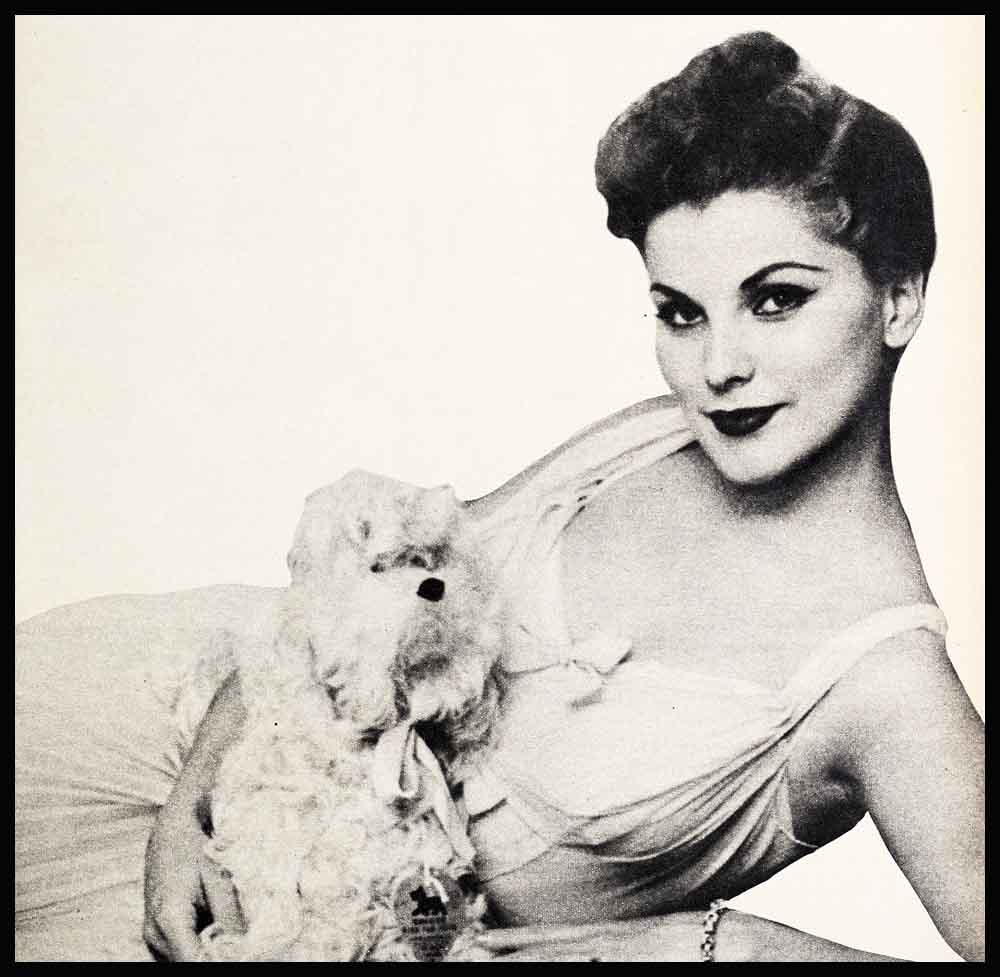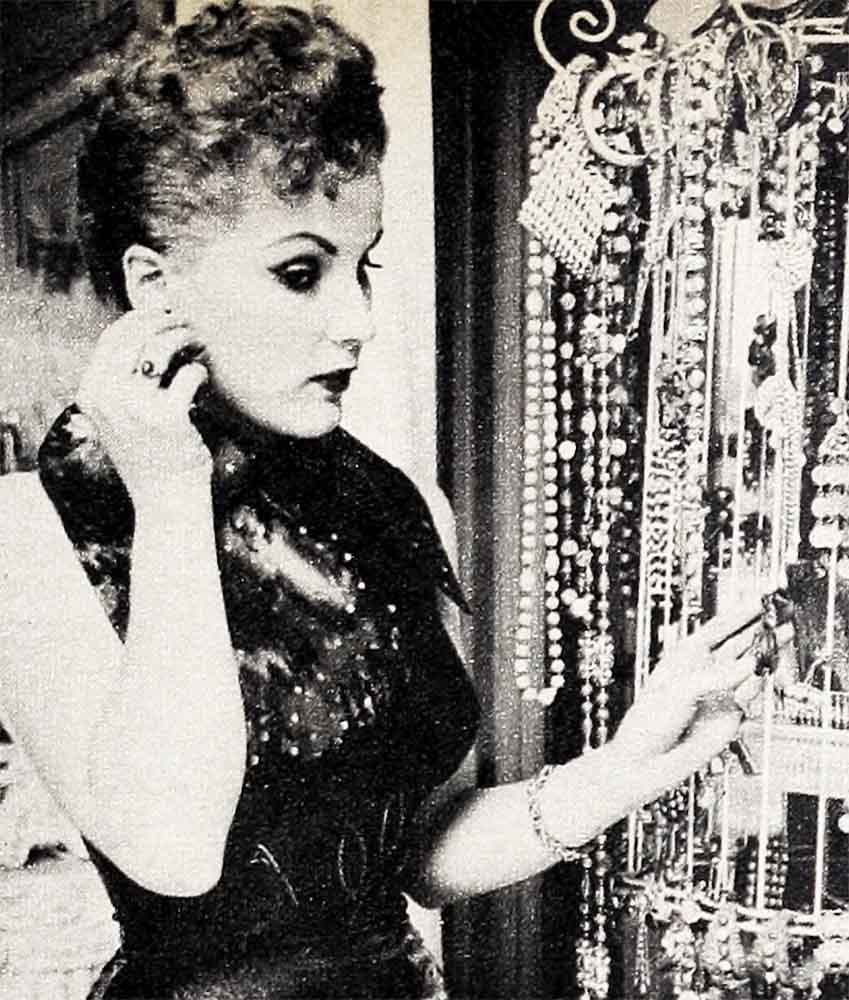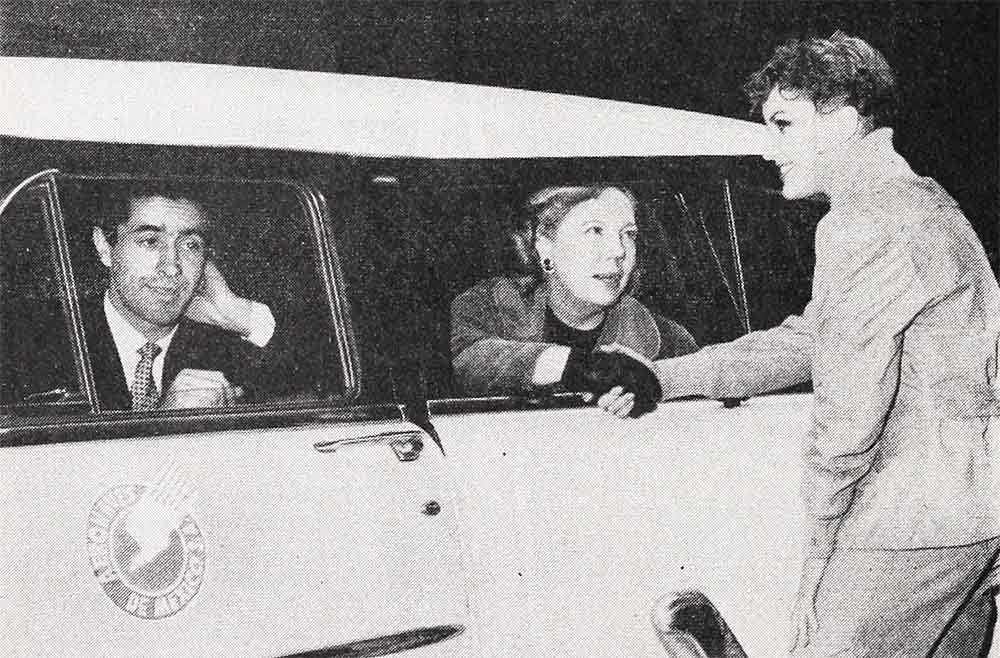
Half Saint—Half Siren
In a fabulous story-book house a block off Sunset Boulevard a lovely girl lay on a bed of strawberry velvet and white satin. She was crying, because Fate had been unkind—or so it seemed.
Debra Paget, actress, wept because a role she had been promised had gone to another young star. Consoling her was her mother Maggie, a brisk and loving buffer in the two different worlds of Debra, when the pieces of those worlds need picking up and putting back together again. . . .
The role she had lost was replaced by another one, an even better one, not long afterwards, and Debra Paget was happy again. Yet tears are no stranger to this shy and beautiful young star. Nor is innocence. On the other hand, neither is sex appeal. Debra has a figure that is breathtaking. In a way, that whistle-bait figure perjures the pure, undisturbed beauty of her face—undisturbed, that is, until the music starts or the cameras turn. Then the veils drop and Debra Paget comes alive with every instinct as ancient as Eve’s, in a transformation which is as puzzling to the observer as it is complete.
AUDIO BOOK
At twenty-three Debra is the most intriguing paradox in motion pictures today. She lives in amazing splendor in the magic world of her own creation, a world she has dreamed about since she was five. Whether because of disillusionment with the Hollywood she grew up in or for some other, secret reason of her own, Debra long ago decided to restore in all its old-time glamour and glitter a movie era of yesteryear. Singlehandedly, if need be, she has undertaken to bring back the excitement of the “movie queen”—the fabulous female who walked the streets of Movietown with a tiger on a leash, or took a bath in bubbling champagne.
Debra lives with her family in an old, twenty-seven-room Mediterranean style mansion which she has leased, located back of the Beverly Hills Hotel. Constance Bennett once lived there. But if the walls could speak, even of the glamorous Constance and the rest of the unforgettable Bennetts, they could tell nothing that would top Debra Paget’s jeweled Cadillac, the mirrored, African-motifed “Mogambo Room” on the third floor, where Debra rehearses her dance routines, her jeweled mermaid murals in the hail or the living-room fireplace which she has converted into a fabulous planting area, including coral flamingos, a silver fountain and a statue of Kuan Yin, the Chinese goddess of fertility.

Debra dresses elegantly, possessing the most glamorous wardrobe of any of Hollywood’s young stars. She wears mink and white fox and blue fox and pink fox. And she has over a hundred custom-made cocktail dresses and evening gowns, all designed to hug her thirty-five-inch bosom and nineteen-inch waist.
She rides in a Cadillac painted strawberry color, to go with her velvet bed, and encrusted with fifteen-hundred dollars’ worth of multi-colored, glittering crystals. Debra and her mother and brother-in-law worked all one night, until five in the morning, jeweling the car.
Why, you ask yourself, would any young and beautiful girl, who could be out on the town enjoying herself, stay up all night pasting gay pink crystals on the top of a car? What can she be like, this young star who lives so lavishly in a romantic world of strawberry velvet and white satin and jeweled mermaids—but without romance?
Debra Paget is the girl who never dates. Why? What was the story, where did all the pieces fit in the life of a young actress Hollywood producers have so enthusiastically acclaimed?
To find the answers, Photoplay’s reporter climbed aboard an Aeronaves Airlines plane bound for Mexico City. There Debra is co-starring with Ray Milland and Anthony Quinn in Benedict Bogeau’s production of “The River’s Edge.” It is a role that could make her a top dramatic star.
But Debra’s own story is as exciting as any movie script. It has all the drama and pathos and conflict that can happen in the life of a girl who is half siren and half saint.
In her Mexico hotel room, wearing a short pink terrycloth robe and gold slippers, brushing her flame-red hair and looking all-siren, Debra tells you quietly why she is here. Why she has been working long hours in the rain day after day, bruising herself crawling over rocks and through underbrush, giving her every emotion to the camera. Why acting is her whole life today.
Leveling amazingly blue eyes on you, the girl directors call “one of the sexiest in Hollywood” says, “I believe there’s a job that each of us is meant to do. And I believe we have a duty to ourselves to do it to the best of our ability. As far as I’m concerned, I think I was put on this earth to act. That’s what I love and it’s my life. Acting, singing, dancing—this is what I can do. How good it is, I don’t know. I try to do my best. But through work I find my happiness. . . .”
In the spacious hotel room in Mexico City the girl who is so dedicated to acting went on, “I played my first movie role when I was only fourteen. That’s pretty young to be suddenly thrust into the motion picture business. There’s something about a big studio that’s so overpowering, and I’m naturally a shy person anyway. Those first years, if somebody asked me a question I would just say ‘Yes’ or ‘No.’ Mother would break the ice for me. She’d get people laughing and make the atmosphere friendlier and I would relax a little.

“Shyness is something I’ve had to grow out of, and I’ve really had to work to change it.”
Debra however, is still slow to trust people. “I have to know somebody a long while. In this business you learn never to trust too much. I’ve been very lucky and I haven’t been hurt badly.
“But perhaps, it’s because my mother’s such a great judge of people.”
The rumor that her mother dominates her life really draws Debra’s fire. “This simply is not true. I get so angry when people say those things. The truth is there’s only one person who runs my life. And that’s me!
“But I hate to fight with people,” Debra says frankly, a fact which might help spread this misconception. By mutual consent her mother, serving officially as her business manager, does much of the fighting for her. Maggie’s always reminding her daughter, “This is a business, Debra. You’ve got to fight for your rights.”
Theirs is a very close relationship. Debra does the acting, and Maggie spares her those things which by temperament or desire Debra feels she isn’t qualified to do.
But once her mother said: “Some day she’s going to have to learn to fight for herself, and the day she feels she no longer needs me, I’ll go. I’m sure it will be painful,v but that’s the way it will happen. But as long as Debra wants me here with her, that’s right where I’ll be.”
“You need somebody you can believe—somebody you know will tell you the truth,” says Debra, who always wants her mother close at hand wherever she works.
Debra’s beauty and her unquestioned sexiness has caused professional and personal conflicts in the girl who is so devoutly sure this is the job she was intended to do, didn’t bargain for and sometimes can’t understand.
Like the jeweled mermaid mural on the wall of the hail in her fabulous house, Debra has beauty that invites without asking. For instance, the crew on a television rehearsal stage just look idly at a pretty and passive girl until Debra goes into her dance. Then the TV censors start looking around wildly for somebody from wardrobe, hollering, “Put a skirt on her!” Debra’s first experience with this, however flattering, was heartbreaking. It was her first big TV show “and they had to go and put a ballet skirt on me.”
The big number was called “The Jaguar,” and, says Debra, “We had a terrific routine where I jumped over this fancy sports car. I was wearing a leotard cut high in the neck and a split skirt that was supposed to come off when I leaped into the air.”

After the dress rehearsal the censor informed her, “You can’t take your skirt off in the number.”
“But I have to,” Debra protested. “In order to jump over the car.”
The wardrobe department hurriedly whipped up a billowing skirt of chiffon and the censor said, “You can’t wear that either.” Through the chiffon, the outline of a flashing, very sexy pair of legs could be seen. Finally they sent to the costumer’s and, as Debra says, “got a ballet skirt that came down to my ankles. They sewed it on me after the show had started. What a hassle! They were sewing, and I was crying, and my agent was saying, ‘You don’t have to do this, I’ll pull you right out.’ And I was sobbing it was too late and I had to go on.
“They shot my routine in a dark corner of the stage, so dark, in fact, that a friend who watched the show at home called up to ask, ‘When did Debra go on?’ ”
Debra’s personal life has caused the usual speculation among columnists.
In Mexico City there had been an absurd romantic rumor. “They’ve had me eloping with the hotel manager,” Debra said. “Mother and I went to a cocktail party given by the Ambassador of Panama. I thought we were going with the assistant manager and his wife, whom we knew, but when we were about to leave, a stranger presented himself to escort us. I thought he had been sent by the ambassador, but he turned out to be the manager of the hotel. A photographer took his picture with me at the party, and the papers ran it. Later, the ambassador’s wife wanted to provide a wedding for us. I told her,” Debra said laughingly, “ ‘Don’t you think you’re rushing things a bit?’ ”
As Debra herself says, she can fight—when there’s a real reason. Although it’s general knowledge that Debra Paget doesn’t go out on the town, a local columnist called one evening recently and wanted to arrange a date with Debra for a personal friend to attend a preview. “Do you think she will go?” he asked her mother.
“I’ll put Debra on. You talk to her,” said Maggie.
The guy went on at length in a patronizing tone, as though he were doing her a favor, and finally Debra had enough. “Look,” she said, “if I won’t go with those who call me direct, I sure won’t go out with a blind date!” And she hung up on him.

“I’ve gone to a few premieres, but I always go with Mother,” Debra says. “I get such a kick out of it when somebody calls and says, ‘You’re invited to such-and-such party afterward. Please tell your escort to wear a bow tie.’ I have to laugh, thinking how Mother would look in a bow tie.”
Debra’s story begins in a house on High Street in Denver, Colorado, right across the Street from where Douglas Fairbanks, Sr., was born. Little Debralee Griffin was fascinated by the house and never tired hearing about the great Doug. She haunted Elitch’s and other theatres where her mother, Margaret Gibson, a legitimate actress, performed in those early years. Debralee loved the “play-acting,” the glamorous costumes and the wigs and makeup. This was a magic, happy land and she wanted to be part of it.
“She begged for this business before she could even talk,” her mother says. “Debra is a real ham. She cannot live without acting, and that’s the full definition of the word!”
To the cute, tow-haired little girl with the serious, wide blue eyes her mother would say, “When you’re old enough to know whether you have the guts and the backbone it takes, then we’ll see.”
When her mother and her older sister, Teala Loring, went out on the road with various shows, Debralee lived for the moment when they would come home, bringing some of the magic back with them. “My sister, Lisa, and I would get into their wardrobe trunks and dress ourselves up in the oddest get-ups.”
Whenever he could, Debra’s father would bundle up the younger Griffins in the family car and they’d trek across the country to Cheyenne or to Chicago or New York, wherever Debralee’s mother and sister were booked.
Backstage—any backstage—whether Elitch’s, or the Gayety in New York, or an old burlesque theatre, was an enchanted world to Debralee Griffin. She would watch, wide-eyed, saying nothing—and missing nothing.
When Teala Loring was signed to a Paramount contract, Hollywood was the Griffins’ home base. And little Debralee was tired of just watching the show. She wanted to be part of it.

“Sit down, Debra, I want to talk to you,” her mother said. Maggie Griffin had been in show business since she was five, and she told Debra what success would demand. The sacrifice it would involve. “If I work with you and help train you to be an actress, and the first time your little friends come over and you say, I’d rather go out and play,’ you’re finished.”
And she added, “Learning to act is not like taking a piano lesson. It is work, work, work.”
Yes, Debra said, she knew. And she would work. For a solemn-eyed little girl this was like taking a vow.
And Debra did work. She took tap and ballet lessons. She studied with her mother and with actress Queenie Smith. She played “Joan of Arc” in a children’s theatre group. “She was merely a child—but she brought tears to everybody’s eyes,” her mother says. And one day, a day and a gamble that was to decide the future of her life, Debra walked with her mother and her brother, Frank, through the magic gate of a motion picture studio.
Margaret Gibson knew Ivan Kahn, then talent head at 20th Century-Fox, and he had once told her: “When your children are ready, bring them out to me.” Debra and her brother tested together in a scene from “Ah, Wilderness,” and Kahn agreed they were both very good. They had talent, no doubt about that. But the studio was cutting down on its stock players and could only hire one of the children. Their mother was to decide which one.
“That was the most difficult decision I’ve ever had to make in my life,” Maggie says slowly now. “I didn’t tell the kids. My son didn’t know until two years ago. I thought they were both good—but I felt the dramatic depth Debra had would carry her a long way.” With a mother’s love she prayed she’d done the right thing.
Two weeks later the combination of innocence and sex appeal got Debra the part of Richard Conte’s sweetheart in “Cry of the City.” Three name players were up for the role, but the studio was looking for the unusual combination of youthful innocence and dramatic ability. Debra was chosen. “I cried all over Richard Conte,” she recalls now.

At fourteen Debra Paget, who’d never had a date in her life, was playing love scenes with Richard Conte and going to school in between.
She was a child in a confusing world of adults. Before the camera she was at home. Acting was her real world—the one she knew and could trust. Here she could talk and laugh and cry. But in the other—Debra Paget was quiet and withdrawn.
From the beginning, Debra defied the customary build-up for a Hollywood starlet. “I will not date for publicity,” she says. “I never have and I never will. There’s no mystery about this, no gimmick. I won’t fake romance, and I don’t see going out unless it’s with somebody you’re sure you’ll enjoy being with. When I am ready to fail in love I will.
“I don’t feel it’s necessary to ‘go out’ with a man to know him, or to find out whether you’re in love with him.
“I think you can fail in love just as easily at first sight as you can seeing a different man every night. I think a girl will know when she’s in love. I have seen so many girls going out with first one and then another man. They don’t know what they want. These poor girls get so confused dating so many fellows that when the right man comes along they don’t even recognize him,” Debra says seriously.
“When people say to me, ‘Where will you meet the man you will marry?’ I tell them that I see people every day of my life, that there’s no place where you meet more people than in the motion picture business. And with personal appearances and foreign locations I go all over the world these days. I’m gone so much—that’s why I love to be home. When I get home I just want to stay there.
“And we entertain people at home all the time. We have big parties and we have small groups of friends in too.”
When asked whether she shies away from a serious romance as a result of being disillusioned or hurt, she says, quietly, “No, I haven’t been hurt. And I’m not afraid of romance. And I’m not disillusioned. This is just the way I feel.”
“She’ll find the right man,” her mother says, “and when she does—and I don’t think it will be too far off—there will be less room for her career, that’s all.
“I want Debra to have everything in this life,” her mother says, and her eyes mist. “She deserves it. I want all my children to have happiness, but Debra especially. She does so much for all of us. There’s nothing we want, nothing we want done that Debra doesn’t try to do. You just don’t find many girls like that.”
Debra’s new sophistication, the chic, short, flame-colored hair-do and the glamorous wardrobe are partly to startle studio executives into realizing little Debralee has grown up. “I’ve been at the studio for ten years and they still see me as fourteen.”
But behind the fabulous wardrobe—the sequins and the tulle and the mink and all the little foxes—is her desire to keep glamour alive.
“Ever since I was a little girl,” she says, “I thought of Hollywood as a glamorous place. And when I got here—well, it was a great disappointment.
“I’d thought of movie stars as being so glamorous, the way Joan Crawford still is today. She never lets you down. But I’ve seen people I’d admired so much walking around Hollywood in slacks and no makeup, and I was so disillusioned. I didn’t particularly care whether I ever saw them again or not. I think you should live up to the role you’re asked to play in life.”
The strawberry velvet and white satin boudoir is also a young girl’s dream of Hollywood, and Debra admits it’s why she conceived such a bedroom.
The jeweled mermaids? “That was strictly for fun!” she sparks. For publicity? “Well, we did it for the publicity,” Debra says frankly, “but for the glamour too. That jeweled Cad certainly is a conversation piece. People keep coming to see it and take pictures of it. The man with the limousine tour—the one who points out star’s homes—told me he’s doing the most business he’s done since Tom Mix’s white car,” Debra says delightedly. “I stopped at a stop light the other day and two men came out of a barber shop with towels around their necks as if somebody had yelled: ‘Fire!’ You should have seen the double take.”
The car was her mother’s inspiration. Her mother said, “Well, Paget, you don’t go out, no scandals, no nothing. We’re getting in a rut. We’ve got to do something.”
“You should see it at night, every stone reflects the light. The car sparkles like diamonds,” Debra says delightedly.
“I don’t think I would ever give up my career completely for marriage,” Debra said, as the sun was sinking in the Mexican sky beyond the square outside her hotel room.
“My career has always been first with me. With this drive that’s inside me I don’t need to search for anything else.”
In the park across from the hotel the Sunday fiesta was picking up steam. Fireworks were booming and the music from the gaily costumed Mexican band was coming in the window loud and gay.
The girl with the flame-red hair in the pink terry cloth robe answered the command. One gold toe began to tap, her eyes sparkled and her lips parted and her body seemed to dance without moving.
Debra Paget was becoming Eve’s daughter again.
THE END
DON’T FAIL TO SEE: Debra Paget in 20th Century-Fox’s “The River’s Edge” and Paramount’s “The Ten Commandments” and “Omar Khayyam.”
It is a quote. PHOTOPLAY MAGAZINE MARCH 1957
AUDIO BOOK




